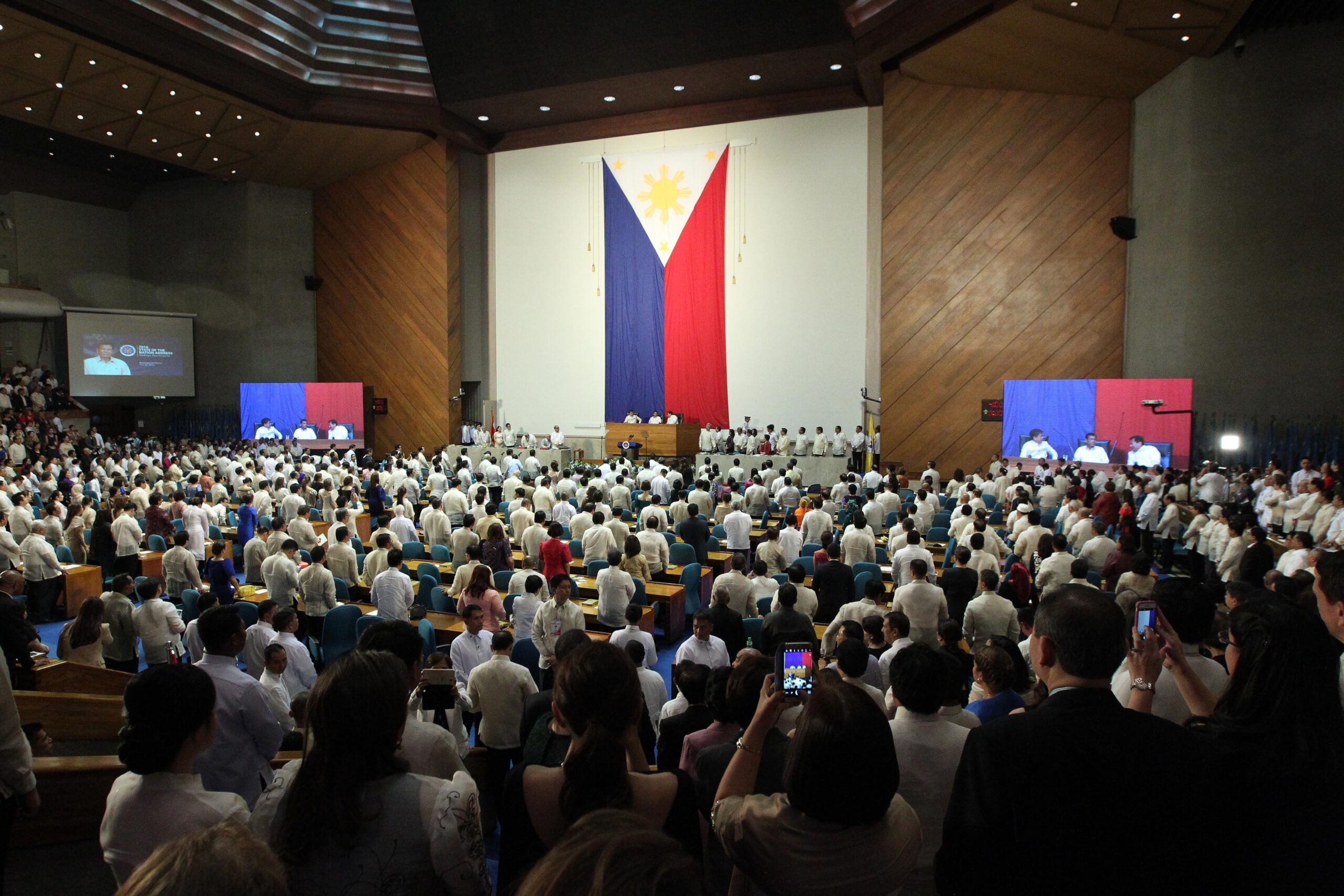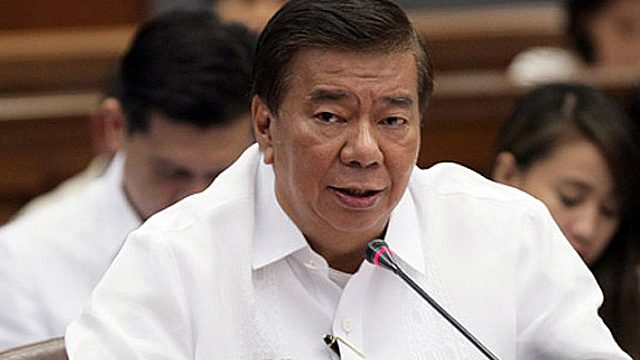SUMMARY
This is AI generated summarization, which may have errors. For context, always refer to the full article.

MANILA, Philippines – President Rodrigo Duterte has changed his mind, again: he was pushing for a Constitutional Convention (Con-Con) as the mode to amend the 1987 Constitution, but he is now espousing a Constituent Assembly (Con-Ass).
In explaining his decision, the President said Con-Ass is faster and cheaper than Con-Con. In the former, Congress is convened to change the Constitution while in Con-Con, the delegates will either be appointed or elected by the people.
While Duterte’s allies have fully accepted it, some lawmakers and analysts oppose the move. Congress, they said, could not be trusted to legislate against its own – something that lawmakers deny.
This distrust is mirrored in the Pulse Asia Ulat ng Bayan survey released April 4 which showed the House of Representatives registering the lowest approval rating with 41%, compared to the Senate’s 49% and the Supreme Court’s 52%.
The 17th Congress cannot be trusted to legislate against its own. – political strategist Malou Tiquia
This distrust does not come as a surprise. After all, several key measures that are equally important, such as the Freedom of Information bill, the anti-political dynasty law, and political party reform act, have languished in Congress for decades.
Political analyst Aries Arugay said that historically, lawmakers only push and protect their own agenda. The same thing could be expected with Con-Ass, he said.
“It’s a bad modality for Charter change. Historically, all they want is lifting of term limits. So no, thank you. Biglang ang sipag naman nila [ngayon] (Why are they suddenly diligent now)?” Arugay told Rappler.
Arugay added that Con-Ass might not result in “progressive” changes as there are more traditional than non-traditional politicians in Congress.
Lawmakers, although deemed “representatives” of the people, do not truly “mirror” society at present, he said.
Prerequisite reforms
Political strategist Malou Tiquia, for her part, said political reforms must be passed first before changing the Constitution through Con-Ass to protect the people and the system. These reforms include strengthening of the political party system, campaign finance, an anti-political dynasty law, and strengthening the Commission on Elections.
“I do not agree that we jump immediately to the said process. We need to pass political reforms first… to ensure the mandate of the people is respected and no syndicate could tamper with the results or program the results. The 17th Congress cannot be trusted to legislate against its own,” Tiquia said.
Duterte is aware of his strong political capital early in his administration, that’s why he is pushing for the speedy yet controversial method of Con-Ass, said Arugay. He was elected by 16 million Filipinos and has posted record-high popularity and trust ratings early in his term.
Many are watching his next move on the issue. As Tiquia pointed out, Charter change would be a “litmus test” for the popular President and his administration.
“Walk your talk and please, no false hopes,” Tiquia added.
Duterte ran and won on a platform of change. His anti-establishment views worked to his advantage, as many Filipinos have grown tired of the exclusive politics that have long plagued the country.
But now, Arugay said Duterte might just be breaking his campaign promises by pushing for an “elitist” system through Con-Ass.
“We want to have a democracy to come out of this process that is more inclusive, more popular, and more progressive. What might happen could be just a strengthening of the elitist, exclusionary, and unresponsive democratic regime that fueled the collective rage that put Duterte in office,” he said.
Arugay added: “In other words, Con-Ass is reneging on the popular will and sentiment that put Duterte in power, a disgust of the political establishment, that he now wants to use to enact the changes he promised? It’s contradictory.”
Reforms do not come cheap
Those against Con-Ass have an over-arching reason: Reforms do not come cheap.
It is not the first time for Con-Ass to be brought up by a sitting president and allies in Congress. During the time of President Gloria Macapagal-Arroyo, there was a swift passage of a resolution calling for Con-Ass to amend the Constitution. The same reason was cited – it was cheaper and faster.
But unlike Duterte, Arroyo had low popularity numbers then, with almost all sectors of society opposing the move. Now, how the public will react to this remains to be seen, considering the President has a strong following. (READ: Duterte enjoys record-high 91% trust rating – Pulse Asia)
A Constitutional Convention would still be ‘more democratic, more open, more participatory, and more inclusive,’ argues analyst Aries Arugay
Arugay said using funding as a main argument for Con-Ass is a “poor excuse.” After all, the stakes are too high to count costs.
“That’s always the argument, even before. But do we really want to be frugal when it comes to overhauling our Constitution and political system? That is such a poor excuse,” he said.
Tiquia said opting for Con-Con is not expensive, considering it will be for the restructuring of the supreme law of the land. The last time the Constitution was examined was 29 years ago, in 1987.
“The so-called P6 billion to P7 billion tag to pursue a Con-Con is not prohibitive if you just look at the waste done with PDAF and DAP. Besides, reforms are not cheap, most especially rewriting a Constitution,” she said.
Senator Risa Hontiveros, for her part, said Con-Ass goes against democracy and “active citizenship.”
Dismissing people’s participation and democratic processes simply because of costs is unacceptable for her. Besides, she said, there are enough government funds to push for a Con-Con instead of Con-Ass.
Referring to Duterte’s reasons, the neophyte senator said: “This is a dangerous thought. This is the seed of undemocratic politics. It assumes that democracy is a luxury rather than a right that developing countries like ours cannot fully enjoy. It assumes that democracy has a price tag and that it can only be enjoyed by the people, subject to the availability of funds.”
An attempt at a “cheaper and faster” mode to amend the Constitution, she said, shows that the shift to federalism is done “haphazardly.”
Like Tiquia, Hontiveros suggested the passage of key measures first – the anti-political dynasty law and prohibition of private armies, among others – to ensure a successful shift to federalism.
Less scrutiny?
Unlike in Con-Con where people outside the legislature can be delegates, in Con-Ass, the whole power resides in lawmakers themselves.
This worries critics. Just like in the passage of any bill where stakeholders strive to convince lawmakers to push for their agenda, Con-Ass might expose the process to influence from outside forces.
“I am extremely worried that some vested quarters are pushing for Con-Ass as this is less prone to public scrutiny and more susceptible to the control of big business, political dynasts, and traditional politicians,” Hontiveros said.
While this is the case, Con-Con is not entirely insulated from the same issues, as it may still be dominated by traditional politicians and their families. The election of delegates requires a national campaign, which in turn requires funds from campaign contributors. Nevertheless, Arugay said, Con-Con would still be “more democratic, more open, more participatory, and more inclusive.”
Duterte, in an attempt to ease fears, said he would be the last line of defense against possible abuses in Con-Ass.

“Besides, I’ll be there. Hindi ako tanga na papayag ako ng Constitution na anti-Filipino. ‘Yan ang asahan ninyo (I’m not stupid that I will agree to a Constitution that’s anti-Filipino. You can depend on that),” he said.
Duterte issued a warning to lawmakers who would abuse their power in Con-Ass.
“If worse comes to worst, e di alam nila ang mangyari sa kanila kung binastos nila ang Pilipino (They know what will happen to them if they insult the Filipino). I will not allow it,” he said.
But for critics, it’s too big a risk to take.
How will Congress vote?
While the passage of Con-Ass in the House of Representatives is seen to be smooth-sailing, the same could not be said in the Senate, where there exists a seemingly weaker alliance with Duterte. (READ: Duterte and the Senate: Of allies, critics, and in-betweens)
Aside from the fact that the majority in the Senate is still controlled by non-Duterte party mates, senators will expectedly protect their own by pushing for separate voting. In Con-Ass, a vote of three-fourths of the majority of Congress is needed.
Senate Minority Leader Ralph Recto said that it would be one of the contentions. It was the same issue between the two chambers during the time of Arroyo, when senators insisted that they vote separately from the House, as their power would be diluted by the big number of representatives.
“Dapat it should be done separately – dahil kung hindi separately ‘yan, magiging 24 lang kami plus the 300. Hindi maririnig ang boses ng Senado kung ganoon. Matatabunan kami sa dami nila. So mas mabuti ‘yung voting separately, if at all,” Recto said in a radio interview on Friday, July 29.
(It should be done separately. If not separately, we are just 24 plus the 300 [representatives]. Our voices would not be heard, if that’s the case. We would be drowned out by their voices. So it’s better if voting separately, if at all.)

Senate President Pro Tempore Franklin Drilon, who supports the establishment of a Con-Con, remained noncomittal despite the suggestion of the President. He said the Senate would take Duterte’s views into consideration.
Ultimately, however, it is the Filipino people who should decide on the mode by which the 1987 Constitution should be amended.
“But what is more important is that the mode that we will apply will be ‘acceptable’ to all the Filipinos, to whom the amendments will be submitted for ratification,” Drilon said.
Without directly reacting to Duterte’s Con-Ass suggestion, Drilon, chairman of the Senate committee on constitutional amendments, said revising the Constitution is “a delicate task” and they would have to discuss with experts how best to do this.
Whether or not Duterte’s popularity and hold on the House of Representatives will be enough to push for Con-Ass is yet to be seen. It’s a divisive issue that would ultimately need the approval of Filipinos, including the 16 million who elected him into office. – Rappler.com
Add a comment
How does this make you feel?
There are no comments yet. Add your comment to start the conversation.